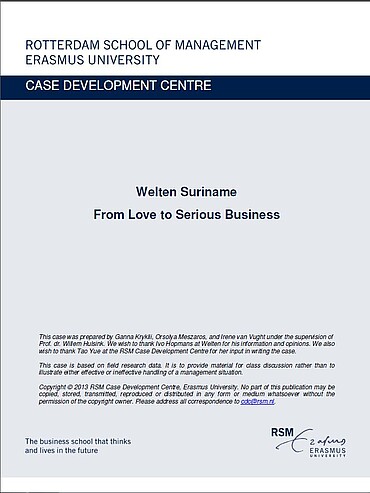Citation Note
Based on field research; 19 pages.
Follow the 'handle' link to access the Case Study on RePub.
For EUR staff members: the Teaching Note is available on request, you can contact us at rsm.nl/cdc/contact/
For external users: follow the link to purchase the Case Study and the Teaching Note.
Objective
The case has three main teaching objectives focusing on internationalization strategy: 1. To highlight the importance of planning, market screening before implementing internationalization strategy, and to introduce methods for market selection. The case includes many internationalization efforts by Welten without success. By having a deeper look at these attempts and the reasons for their failure, one can see that Welten failed to systematically plan or prepare any of these steps. The lessons learned from these efforts serve as grounds for understanding how to assess a company’s products’ or services’ marketability in another country and how to select a target market. 2. To highlight the importance of cultural and administrative differences while preparing and implementing an internationalization strategy. Besides the many important aspects of market screening, the case, by its very nature, emphasizes the importance of cultural and administrative differences. It gives a specific example of preparing for and handling these differences. Therefore, the case not only shows the importance of these differences but also serves as an example of lessons learned. 3. To make students think about whether a company can re-establish its business in a market from which it previously had to withdraw, and if so, how it may be possible. The case addresses the special issue of re-establishing business in an international market, which is a common phenomenon. The case shows what aspects should be examined in relation to re-internationalization, and how such a strategy should be prepared. In that sense, it also highlights the issue of entry mode selection.
description
Welten, a pioneer in the combination of financial education and secondment in the Netherlands, failed to expand into Suriname (the former Dutch colony) in 2008. Four years later, Welten considered returning to Suriname. Would it succeed this time?
Abstract
Abstract. Cees Welten, after starting his own career at other financial institutes, soon felt an inner drive to establish his own company, Welten, specializing in providing both education and secondment services for banks and insurance companies. Even though few companies could successfully compete with Welten in the Netherlands, Welten had difficulties in internationalization, and many of its attempts failed. In 2012, Welten faced the burning issue of re-establishing its activities in Suriname. The company already had tried to expand in Suriname in 2008, but it had been forced to withdraw for economic, political and cultural reasons. This case, introducing Cees Welten’s dilemma on whether or not to return to Suriname, develops and highlights essential fields of an enterprise’s internationalization process. The central issues entail how a company can select its foreign target market, along with its entry mode; how it can assess its international marketability; the steps needed to prepare for implementing an internationalization strategy; how important the role of cultural differences is in internationalization; what is the role of the CEO in implementing internationalization; and how it is possible (if at all) to re-establish business in a foreign market after a failed attempt at internationalization.
usage
The case is written for both entrepreneurship and strategic management students. From an entrepreneurial point of view, the case, besides providing an example of an entrepreneurial success, serves as an example for thinking about the importance of and the possible pathways to internationalization for a growing enterprise. From a strategic managerial point of view, the emphasis is more on showing how to approach and implement internationalization.
